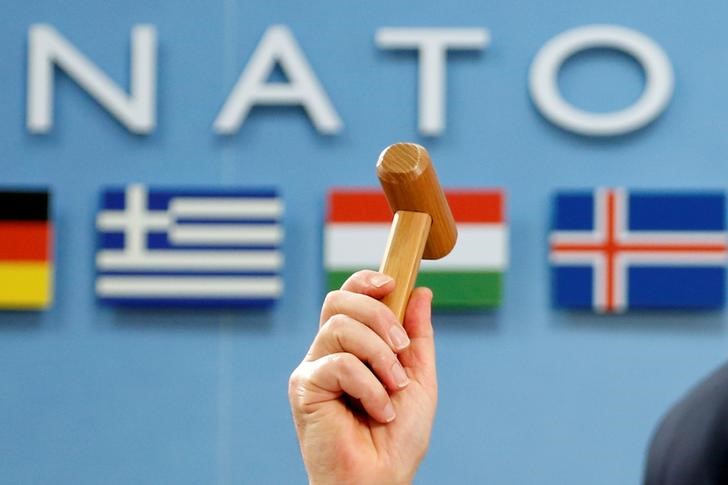By Peter Apps
July 9 (Reuters) - When NATO leaders meet in Brussels this week, all eyes will be on Donald Trump and his demands that European nations pay more for their defense. The truth, though, is that keeping the alliance effective – or even alive – will take much more than finding extra cash or placating the U.S. president.
In many respects, NATO – which turns 70 next year – has found new purpose and effectiveness with the return of Russia as a threat. Since Moscow's annexation of Crimea in 2014, the 29-member body has dramatically stepped up exercises and troop deployments along its northern and eastern flank. Despite Trump's complaints, most members have increased their military spending – even if few meet the target of spending at least two percent of their gross domestic product on their own defense.
At the same time, however, Trump's election has triggered what is almost an existential crisis. Expectations for the Brussels summit could hardly be lower – indeed, NATO leaders will probably be relieved if it is anything other than a disaster. In a speech last year, the U.S. president excoriated NATO leaders over their defense spending and failed to explicitly endorse Article 5, the alliance's mutual defense clause. After trade and other divisions dominated last month's G7 meeting in Canada, many expect the NATO gathering to be worse still.
Managing the diplomatic fallout from whatever happens in the next few days – including Trump's July 16 meeting with Russian President Vladimir Putin in Finland – will be important if NATO is to avoid a further crisis. So is getting new commitments for military investment and cooperation from major European nations, particularly Germany. To truly defend itself, however, the alliance must do significantly more to build its resilience, flexibility and ability to deal with national security challenges more complex than anything it was originally designed for.
News on Sunday that a British woman had died from apparent exposure to the same nerve agent used in the suspected attempted assassination of a former Russian double agent in the English town of Salisbury is a reminder of just how unorthodox some of those new threats can be. Like a cyber attack or Moscow's suspected interference in elections, the Salisbury poisoning falls well outside the kind of conventional military assault that would trigger the self-defense clause.
There is a growing view the organization now needs an “Article 5a” that nations can trigger when faced with this kind of unconventional attack. Such a step would signal to Moscow that the West is serious about confronting such actions. Already, financial sanctions against Kremlin-linked investments in the West offer an option for NATO governments to push back. So far, such steps have been distinctly ad hoc and a more coordinated approach would bring clear benefits.
The same goes for defense cooperation, particularly command and control. Since 2014, NATO has done a credible job coordinating a range of major exercises and troop deployments, particularly its Enhanced Forward Presence (eFP) of mainly U.S., British, French, German and Canadian troops in the Baltic states and Poland. The truth, though, is that in the event of any attack, the alliance would need a much more coordinated command structure than exists at present.
During the Cold War, NATO's Supreme Allied Commander Europe – who was also always head of the U.S. European Command and the senior U.S. officer on the continent – had much more direct authority to command troops across the alliance. Since then, individual states have clawed back much more veto power over how their troops are used. In any conflict, that could yield chaos – and hammering out a more unified command structure would send a clear signal to Moscow that NATO takes deterrence seriously.
So would boosting up the continent's broader defense infrastructure. In the run-up to the NATO summit, Britain has suggested Germany should look at strengthening its bridges and adapting its rail infrastructure to move troops and equipment more easily. Recent NATO exercises have already focused heavily on moving considerable bodies of troops and weapons quickly, and anything that streamlines that process would again send a signal to Moscow.
Given Russia's ongoing attempts at disinformation and political manipulation, it might also make sense to set up a central hub for much more coherent strategic messaging from the alliance. NATO already has a strategic communications center of excellence in Latvia, but it is essentially a think tank rather than a coherent center coordinating other countries. Such a body could work alongside existing EU and other efforts to both track and push back against Russian actions, as well as coordinating communication around exercises or in crises in a much more meaningful way.
Ultimately, though, as Trump has proven, the greatest danger facing the NATO alliance lies within the politics of its individual countries. If Europe and North America cannot achieve political consensus and continue to embrace increasingly idiosyncratic policies and politicians – with or without Russian covert encouragement – then maintaining the unity of the alliance will become ever more difficult.
That, in many respects, will be the greatest test this week. That Trump and other leaders wish to pull in different directions is not in doubt. The question is whether, despite that, they can still find common cause to defend a set of overlapping values. If they cannot, then NATO will unravel – and Western states would have to face an already uncertain future without the united front and structure that has protected them for 70 years.
Peter Apps is Reuters global affairs columnist, writing on international affairs, globalization, conflict and other issues. He is founder and executive director of the Project for Study of the 21st Century; PS21, a non-national, non-partisan, non-ideological think tank. Before that, he spent 12 years as a reporter for Reuters covering defence, political risk and emerging markets. Since 2016, he has been a member of the British Army Reserve and the UK Labour Party. The opinions expressed are his own.
